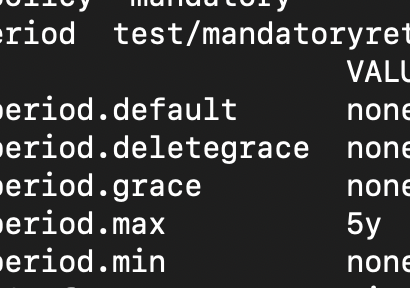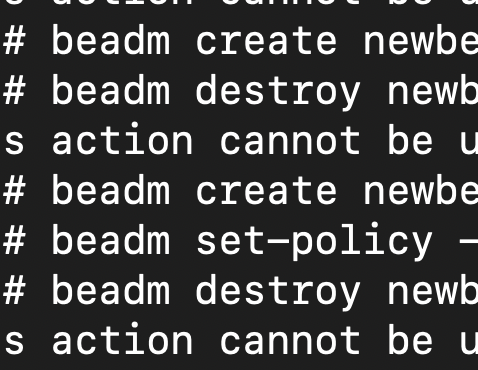It’s a really nifty feature: Let’s assume, you have a config file in your system and you want to allow your junior fellow admin to edit it from time to time, but don’t want him to pass any further rights to him, because this machine is too important.Solaris 11.1 has an interesting feature to delegate the privilege to edit just a set of files. The tool enabling this is called pfedit.
We want to enable a user to edit the httpd configuration, so we have to create a profile for for that task. I made an error at this point when republishing this blog entry.
root@testbed:~# profiles -p "httpd edit"
profiles:httpd edit> set auths=solaris.admin.edit/etc/apache2/2.2/httpd.conf
profiles:httpd edit> set desc="Edit httpd"
profiles:httpd edit> exitOkay, now we assign this profile to the user junior.
root@testbed:~# usermod -P +"httpd edit" juniorWhen the user is log into the system and he or she is executing profiles you will see the profile “http edit”.
junior@testbed:~$ profiles
httpd edit
Basic Solaris User
AllRemember, all doesn’t mean “all privileges” but “privileges all people have on this system”.So let’s edit the file. Start the vi.
junior@testbed:~$ vi /etc/apache2/2.2/httpd.confAt this moment i knew i made a mistake … no … a happy little admin accident. In Solaris 11.4 SRU 79 it’s not Apache 2.2 but Apache 2.4. The file /etc/apache2/2.2/httpd.conf doesn’t exit. I had to try it with the correct path.
junior@testbed:~$ vi /etc/apache2/2.4/httpd.confDamned. You can open that file, but you can’t save it. Well. Not so fast. You have to use the command pfedit to use the new won authorisation.
junior@testbed:~$ pfedit /etc/apache2/2.4/httpd.conf
pfedit: User junior is not authorized to edit the file /etc/apache2/2.4/httpd.conf.Obviously, when the file is now at a different location, i don’t have the authorization. Because that one is for the old location. I simply don’t have the authorization for /etc/apache2/2.4/httpd.conf, only for /etc/apache2/2.2/httpd.conf. I had to change this.
root@testbed:~# profiles -p "httpd edit"
profiles:httpd edit> set auths=solaris.admin.edit/etc/apache2/2.4/httpd.conf
profiles:httpd edit> exitOkay, just to check if it wasn’t the missing authorization that prevented vi from working.
junior@testbed:~$ vi /etc/apache2/2.4/httpd.confNope, as expected. You really have to use pfedit.
junior@testbed:~$ pfedit /etc/apache2/2.4/httpd.conf
pfedit: /etc/apache2/2.4/httpd.conf has been updated.The update is done atomically. At first pfedit makes a copy of the file, then you edit the the copy, and when the copy has changed, you will get a new file at the original place as the old file is replaced with the just edited copy. As there are as many preferences for an editor as there are people and editors, you can define the editor used by pfedit by setting the environments EDITOR or VISUAL(the later beats the first).
Okay, now the new admin want to edit the mime.types file.
junior@testbed:~$ pfedit /etc/apache2/2.4/mime.types
pfedit: User junior is not authorized to edit the file /etc/apache2/2.4/mime.types.As you have seen with the happy little admin accident, you really just have the authorization for the exact file at the exact location in the filesystem. You have to add an authorization for mime.types.
root@testbed:~# profiles -p "httpd edit"
profiles:httpd edit> info
name=httpd edit
desc=Edit httpd
auths=solaris.admin.edit/etc/apache2/2.4/httpd.conf
profiles:httpd edit> add auths=solaris.admin.edit/etc/apache2/2.4/mime.types
profiles:httpd edit> info
name=httpd edit
desc=Edit httpd
auths=solaris.admin.edit/etc/apache2/2.4/httpd.conf,solaris.admin.edit/etc/apache2/2.4/mime.types
profiles:httpd edit> exitAnd now you can edit mime.types.
junior@testbed:~$ pfedit /etc/apache2/2.4/mime.types
pfedit: no changes for /etc/apache2/2.4/mime.types.


